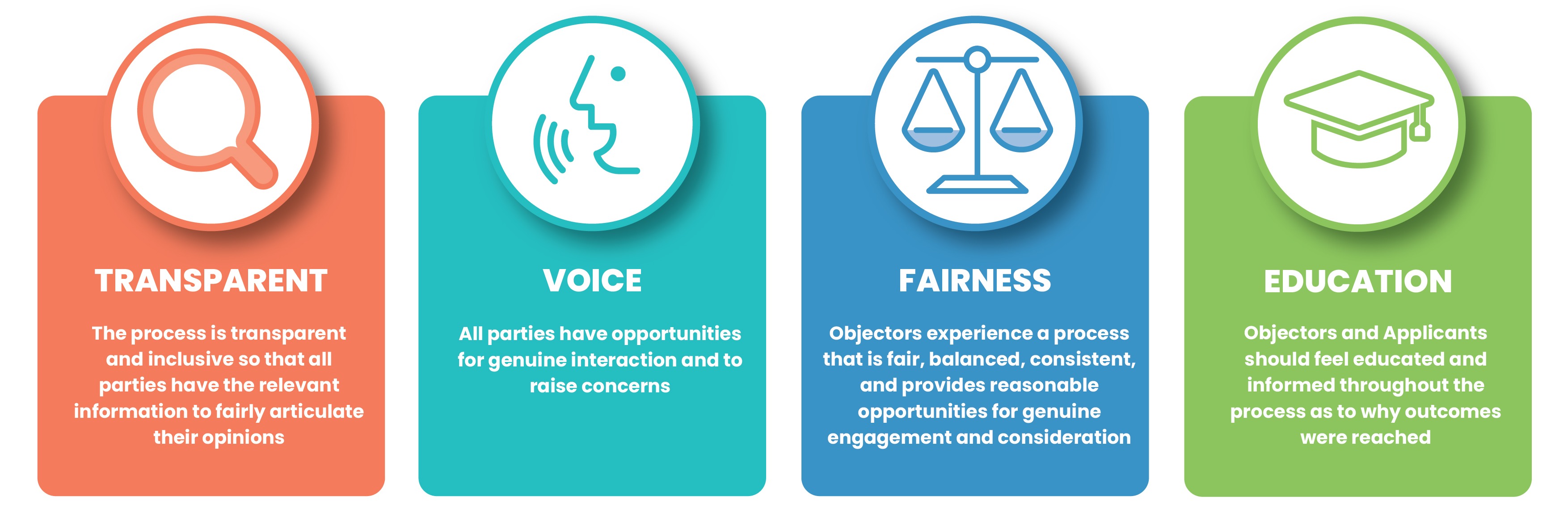Public notice, advertising and feedback

Contact the Statutory Planning Team
For any queries regarding this process:
- Email: planninginfo@ballarat.vic.gov.au
- Phone: 53205500
Public notice and consultation
View Advertised Planning Permit Applications.
Application consultation
Where it is considered that a proposed development may cause third parties material detriment, notice of an application is sent to adjoining properties and any other parties which Statutory Planning consider may be materially affected. This is typically by way of letters to neighbours, sign(s) on-site and, where necessary to reach a broader audience, notice in local newspapers.
Applications are publicly advertised in order to better understand local views and conditions. During the public advertising period, application documents are available to view either online or in person at The Phoenix, 25 Armstrong Street South, Ballarat Central.
Whilst notice of an application is typically sent to adjoining properties and also by way of a sign(s) placed on site, in accordance with new assessment pathways introduced by the Victorian State government following the release of its 2023 Housing Statement, in certain cases third parties no longer benefit from the right to appeal decisions to the Victorian Civil and Administrative Tribunal (VCAT). Please speak with the assessing Officer to understand if third-party appeal rights exist in any case of interest to you.
Please note, application documents are only available for the purpose of considering a development proposal in accordance with the Planning and Environment Act 1987. Documents must not be used for any purpose which may breach copyright laws.
Make a submission in response to an application
A submission may be an expression of support or objection.
Some applications are exempt from the notice requirements and review rights of the Planning and Environment Act 1987. These applications will not be advertised.
If you wish to make a submission in response to an advertised application:
- Go to eServices Advertised Planning Permit Applications;
- Search and select the planning application you wish to respond to;
- Review documentation, select the 'Submit Response' button at the bottom of the page;
- Complete the application response, including uploading supporting attachments
Submission requirements
A submission must include your name and contact details (email address, postal address and/or telephone number). Without contact details we are unable to acknowledge your submission or provide you with future correspondence regarding the status of the application.
An objection must set out your reasons for opposing the development and how you might be affected. The most effective objections are those which include suggested alternatives.
Submission considerations
Petitions are considered one submission only and all correspondence will be addressed to the lead signatory. Please be aware that as lead signatory, responsibility for advising other signatories of the progress of an application (including consultation meetings and Council meetings) rests with you.
The City of Ballarat can only consider representations based on planning grounds (property devaluation and commercial competition are not valid grounds upon which to base an objection).
All submissions will be made available to the permit applicant at the conclusion of the advertising period. Personal and identifying information will however be redacted in accordance with privacy legislation.
Submissions are accepted up until a decision is made.
Post-objection consultation framework
The post-objection consultation process provides both the permit applicant and submitters with an opportunity to better understand each other’s views.
Consultation meetings are solutions-focussed and are not a forum for parties to re-state their cases. The key issues generated by an application will be known by all parties prior to any meeting. Parties should attend with an open mind and willingness to negotiate.
Where objections have been received in response to an application, the assessing officer will first ask the applicant if they are willing to attend a meeting. To determine this the permit applicant should consider the value of any such meeting, including:
- The content of the objections received;
- The number of objections received; and
- The potential outcomes of any meeting. Based on the content and number of objections received, is it likely that solutions can be found?
Post-objection consultation meetings are not a legislated element of the planning assessment process. Meetings are in addition to application notice requirements as set out in Section 52 of the Planning and Environment Act 1987 and rely upon the willingness of parties to engage in discussions.
The City of Ballarat’s consultation process is based upon the principles of procedural fairness. These principles reflect what Statutory Planning want all parties to experience when engaging in the planning process. These principles are:
- Transparent – The process is transparent and inclusive so that all parties have the relevant information to fairly articulate their opinions.
- Voice – All parties have opportunities for genuine interaction and to raise concerns.
- Fairness – Objectors experience a process that is fair, balanced, consistent, and provides reasonable opportunities for genuine engagement and consideration.
- Education – Objectors and applicants should feel educated and informed throughout the process as to why outcomes were reached.

Search the Town Planning Public Register
To view previously issued planning permits, search the Town Planning Public Register. Search by address or permit number.
Please note: Only redacted copies of permits and plans can be provided in accordance with Section 2.1 of the Privacy and Data Protection Act 2014. As such, documents accessible to third parties will not include the personal information of the permit applicant or parties associated with the preparation of documents.